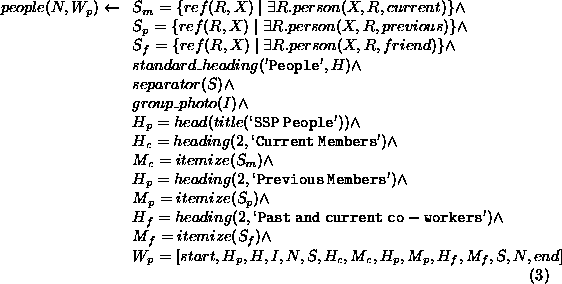


Next: Parameterisation System (Simple
Up: No Title
Previous: Problem Description Language
We now show how we defined the connection between conceptual model and
HTML structures .
The basic idea is to define a ``top-level'' predicate which generates
the entire WWW site description and use its preconditions to construct
the smaller site components. An example of a top-level site generator
and some smaller components is given below.
.
The basic idea is to define a ``top-level'' predicate which generates
the entire WWW site description and use its preconditions to construct
the smaller site components. An example of a top-level site generator
and some smaller components is given below.
We have a site consisting of pages
 if
if  is the set of main
pages, given the set
is the set of main
pages, given the set  of topic clusters, and
of topic clusters, and  is
the set of project pages, given the set
is
the set of project pages, given the set  of project
identifiers. To construct these pages we also need
of project
identifiers. To construct these pages we also need  which
contains the hypertext references to each of the topic clusters and is
embedded within each page as a convenient means of navigation.
which
contains the hypertext references to each of the topic clusters and is
embedded within each page as a convenient means of navigation.

The main pages are the set  of pages named P with
contents,
of pages named P with
contents,  , for which we can satisfy the relation
, for which we can satisfy the relation
 where
where  is the navigator for the page.
Thus, if `people' is one of the elements of
is the navigator for the page.
Thus, if `people' is one of the elements of  and we can
satisfy
and we can
satisfy  then
then  is an element of
is an element of
 .
.

This takes us down to the level of generating individual HTML pages.
Rather than describing all of these for the site (there are six page
templates in total) we describe a characteristic example, which deals
with the people in the group. The expression which
generates this page from our conceptual model is given below.
A page describing the people in the group is represented by the
sequence of HTML structures corresponding to: the page title,
 ; standard heading, H, for group pages; our group photo,
I; the navigator, N; another separator; a list of
current members,
; standard heading, H, for group pages; our group photo,
I; the navigator, N; another separator; a list of
current members,  , with heading; a list of past members,
, with heading; a list of past members,
 with heading; a list of friends of the group,
with heading; a list of friends of the group,  , with
heading; a final separator; and a second instance of the navigator.
, with
heading; a final separator; and a second instance of the navigator.

Our standard heading for pages consists of the group name, G,
followed by a separator.

A separator consists of an appropriately aligned coloured bar.




Next: Parameterisation System (Simple
Up: No Title
Previous: Problem Description Language
Dave Stuart Robertson
Tue Jul 7 10:32:11 BST 1998
 .
The basic idea is to define a ``top-level'' predicate which generates
the entire WWW site description and use its preconditions to construct
the smaller site components. An example of a top-level site generator
and some smaller components is given below.
.
The basic idea is to define a ``top-level'' predicate which generates
the entire WWW site description and use its preconditions to construct
the smaller site components. An example of a top-level site generator
and some smaller components is given below.



 if
if  is the set of main
pages, given the set
is the set of main
pages, given the set  of topic clusters, and
of topic clusters, and  is
the set of project pages, given the set
is
the set of project pages, given the set  of project
identifiers. To construct these pages we also need
of project
identifiers. To construct these pages we also need  which
contains the hypertext references to each of the topic clusters and is
embedded within each page as a convenient means of navigation.
which
contains the hypertext references to each of the topic clusters and is
embedded within each page as a convenient means of navigation.

 of pages named P with
contents,
of pages named P with
contents,  , for which we can satisfy the relation
, for which we can satisfy the relation
 where
where  is the navigator for the page.
Thus, if `people' is one of the elements of
is the navigator for the page.
Thus, if `people' is one of the elements of  and we can
satisfy
and we can
satisfy  then
then  is an element of
is an element of
 .
.

 ; standard heading, H, for group pages; our group photo,
I; the navigator, N; another separator; a list of
current members,
; standard heading, H, for group pages; our group photo,
I; the navigator, N; another separator; a list of
current members,  , with heading; a list of past members,
, with heading; a list of past members,
 with heading; a list of friends of the group,
with heading; a list of friends of the group,  , with
heading; a final separator; and a second instance of the navigator.
, with
heading; a final separator; and a second instance of the navigator.


